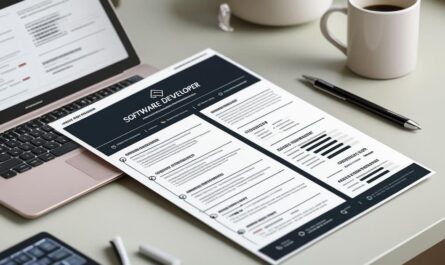Grad guide for Ghanaian tech applicants is your friendly companion through the maze of landing your first role in technology, tailored just for you as a recent graduate or soon-to-be grad in Ghana. With so many people looking for roles in the fast-growing tech sector, you might feel anxious or curious about your chances. Maybe a friend just snagged a remote job with an international company, and now you’re motivated, but unsure how to make your own entry. Nagging questions like “Do employers care about my university?” or “Is it important to have a portfolio?” may have popped up. Here’s a grad guide that speaks directly to Ghanaian tech applicants and gives you honest answers, actionable steps, and real-life examples.
Ghanaian tech applicants experience a vibrant but competitive environment. Your journey often begins on campus: the excitement of coding bootcamps at Legon, hackathons sponsored by MTN, and sometimes, that nervous thrill of your first error message. You, like many other Ghanaian tech applicants, realize quickly that academic grades are only part of the bigger story. More employers want to see what you can build, how you communicate, and your ability to keep learning. Thereby, your degree should not be the only tool in your kit.
Building a Standout Ghanaian Tech Applicants Portfolio
Firstly, your portfolio is known to be your strongest proof of talent as a Ghanaian tech applicant. Don’t rely only on class projects. You should build applications that solve real problems in Ghana, maybe a mobile money expense tracker or a WAEC result aggregator. These projects showcase not just your coding skills but also your understanding of local needs. Meanwhile, it is important to host your code on platforms like GitHub and deploy your apps with accessible links, so employers can interact with your work directly. Your portfolio signals that you’re not waiting for assignments, you’re already contributing.
Secondly, soft skills cannot be ignored. Employers are also looking for team players, active communicators, and “self-starters.” You can demonstrate this by participating in tech meetups in Accra, joining open-source African tech projects, or mentoring juniors. Anecdotes from thriving Ghanaian professionals reveal how networking at these events led them to internships and jobs otherwise never advertised.
Thirdly, consider internships even during your holidays. The hands-on experience you get, say, at local fintech startups like Zeepay or ExpressPay, arms you with practical skills and connections. If you find it difficult to land formal internships, you can volunteer for NGOs or small businesses by building their websites or automating tasks. These experiences are important, and they’ll add depth to your application as a Ghanaian tech applicant.
Mastering the Ghanaian Tech Application Process
Applying for jobs may seem intimidating, particularly when you see long lists of requirements. However, it’s important to know that most Ghanaian tech applicants don’t meet every single criterion, they apply anyway and still get interviews. You should tailor your CV and cover letter to match the keywords in each job posting, emphasizing your portfolio and team projects. As a Ghanaian tech applicant, showing adaptability is a big win; “I learned Python in two months for a freelance project” shares both initiative and commitment. On the other hand, avoid generic statements. Instead, describe direct outcomes: “I improved site load times for a Kumasi e-commerce vendor by 30%.”
Statistics show that more Ghanaian companies are moving towards online assessments or short technical challenges in the recruitment process. Practice regularly on online platforms like LeetCode, HackerRank, or Codewars, focusing on problems similar to those in local hackathons. Meanwhile, mock interviews with peers can help you overcome the interview jitters.
Ghanaian Tech Applicants: Nailing the Interview
Interviewing can sometimes feel like facing your WAEC examiner again, but there’s a twist, you’re allowed, and even expected, to show personality. Your communication style, attitude, and confidence are important as the code you write. One successful Ghanaian tech applicant, Ama, recalls how sharing her process for troubleshooting a tricky bug set her apart from other candidates. Employers remember thoughtful, authentic answers over perfect ones.
During your interview, you should prepare for scenario-based questions. For example, “Describe a time you disagreed with a teammate and how you resolved it.” Here, you can tell your own story, perhaps about collaborating to finish a final-year group project despite different ideas. You can also prepare to solve a simple live coding task, such as reversing a string or explaining your approach to a failed deployment.
Many companies pay careful attention to cultural fit. Meanwhile, you showing that you engage with the Ghanaian tech community (like the Developers in Vogue network or Google Developer Groups Ghana) or that you attended local conferences will boost your credibility.
Ghanaian Tech Applicants Remote and International Opportunities
The pandemic shifted work patterns, and now, Ghanaian tech applicants are tapping into global job boards and remote internships. Upwork, Turing, and Andela offer pathways to jobs with foreign firms. You should note that these positions usually expect proof of English proficiency, clear communication, and reliable internet connectivity.
Important advice here: keep your LinkedIn and Twitter professional, with regular updates about your projects or learning journeys. Recruiters now look beyond your CV, using your online footprint to measure your motivation and readiness.
Ghanaian Tech Applicants Overcoming Local Challenges
You might face unreliable electricity, expensive data bundles, or limited mentorship. But you can lessen these challenges by joining co-working hubs in Accra, Kumasi, or Takoradi which provide backup power and high-speed Wi-Fi. Sharing resources and interview tips on WhatsApp or Telegram groups for Ghanaian tech applicants is also popular. Meanwhile, you can volunteer as a mentor or seek mentorship through platforms like Codetrain.
Importantly, government and private sector partnerships are increasing training opportunities. The Ghana Tech Lab, for instance, runs training programs and demo days for young coders. These programs are important for closing the experience gap, and they come highly recommended.
A Unique Advantage for Ghanaian Tech Applicants
Many firms are also looking for locally aware techies who understand West African consumer needs. On the other hand, you, as a Ghanaian tech applicant, have a unique vantage point to design apps or websites for Ghanaians, like integrating Mobile Money payments or using local languages in UI. Sharing these projects in your application makes your profile shine.
Lastly, you should always keep learning: new programming languages, frameworks, and even soft skills like public speaking and writing. The tech field changes rapidly, but so do your opportunities. As you continue your journey as a Ghanaian tech applicant, remember that your experience, culture, and persistence are important and mean a lot to employers both local and international.



